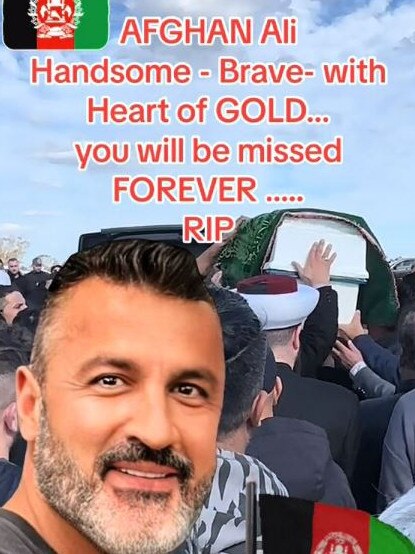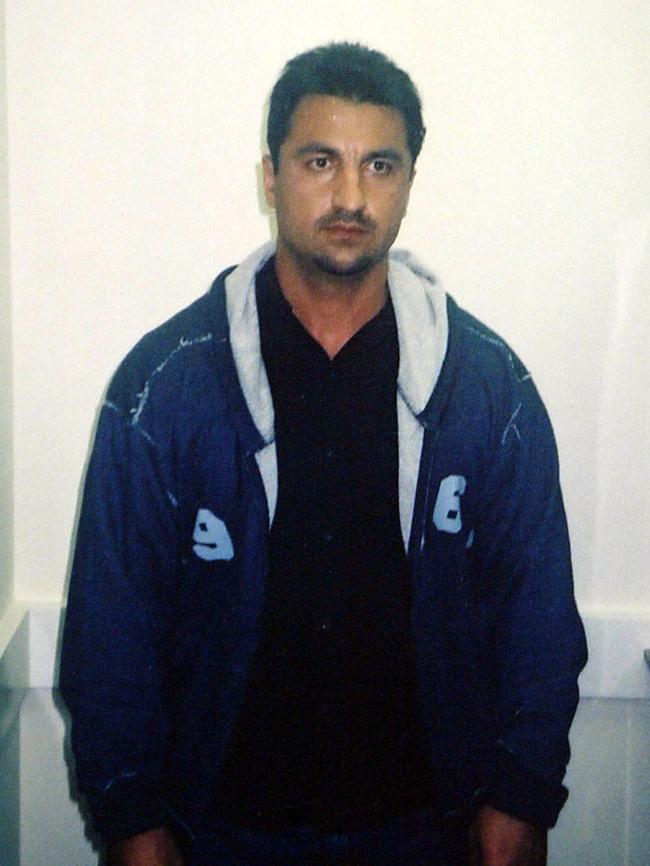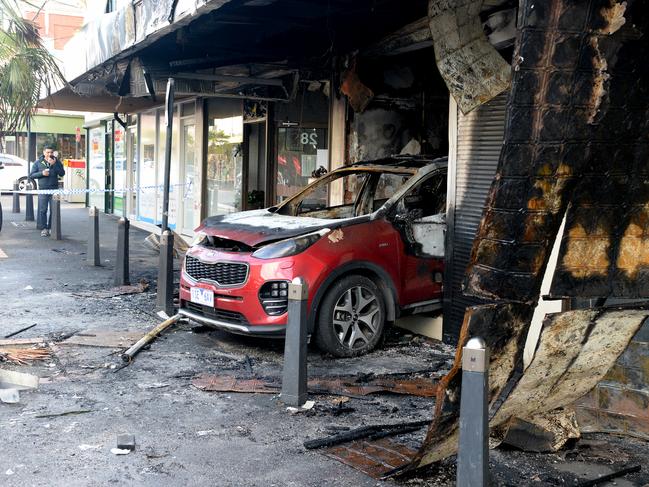Punitive tobacco tax drives smokers to black market
A punitive tobacco tax hasn’t stopped people smoking, it’s driven previously law-abiding smokers to a booming black market and left dead bodies and a string of arson attacks across Melbourne in its wake.
Police & Courts
Don't miss out on the headlines from Police & Courts. Followed categories will be added to My News.
Smoking kills but not as fast as the smoking gun that shot down the gangster they call Afghan Ali.
The feared enforcer, real name Mohammed Keshtiar, had survived guerrilla warfare in Afghanistan before coming to Australia, land of opportunity for young gangsters.
But a volley of pistol shots in a South Yarra street one night last month ended his bloodstained rise.
Keshtiar, 19 when he migrated, was familiar with guns and illegal drugs since childhood. He made the step from nightclubs to outlaw clubs in his 20s.
After being jailed for 12 years for two shootings that cemented his reputation for murderous rages, he became close to the Mongols outlaw motorcycle gang — and to would-be Mr Bigs in the illicit tobacco market.
Friends like that make enemies. An innocent man died in Keshtiar’s place when a shooter sat off his family home in Narre Warren in 2017. The victim was Zabi Ezedyar, a young plasterer who paid a high price for a hitman’s mistake.
Keshtiar, by then in his late 40s and a survivor of years in high-security prisons, turned to high-security luxury apartment blocks to avoid street-level threats. Early this year he and his girlfriend moved into an apartment in the Capitol Grand on the corner of Toorak Rd and Chapel St.

The apartment idea was only as good as its weakest link, Keshtiar’s habit of walking the short distance from a nearby all-hours gymnasium to a rear entrance.
As he approached the entrance in Almeida Cres shortly before midnight on August 4, a shooter ambushed him with what sounded like a heavy calibre handgun.
The twist to the Afghan Ali hit is that investigators believe he’s a casualty of a smouldering tobacco war which has flared into open violence after years of rising profits and growing tensions.
In the six months before his murder, at least 10 shops selling illicit “knock off” cigarettes were hit in arson attacks across Victoria. Since his shooting, more have been torched, one in Oakleigh this week.
The string of arsons suggests the real cause of at least some unsolved underworld shootings is a tobacco turf war.
It seems that stiff taxes aimed at making smoking unaffordable have handed organised crime a bonanza. And bad guys have always killed each other over easy money.
There are rumours of a “tobacco commission” determined to control prices and supply lines across the exploding number of unregulated tobacco stores.

For years now, anonymous vans full of cigarettes, loose tobacco and vapes have done weekly delivery runs in every suburb and regional centre in Victoria with no hindrance from police. This has made certain middle eastern families hugely wealthy.
But where there are vast profits, there will always be disruptors wanting to undercut prices. Then the shooting and torching starts.
What no one knows for sure, except the shooters and the shot, is the number of casualties that are victims of tobacco bootleggers — crooks as violent as the mobsters spawned by American Prohibition in the 1920s, the era that spawned Al Capone, Lucky Luciano and the “five families” of New York.
What police and insiders know is that where there was once about 50 tobacco stores around the state, now there are closer to 1000, all unregulated, all dealing in cash only for “knock-off” brands that sell for less than half of what taxed cigarettes cost.
This booming black market highlights the massive profits in play. It also shows that health authorities and medical pundits have no idea of the true number of smokers in the community.
For years, especially since 2010, Governments have ramped up tobacco excise in the hope that sheer cost will help eradicate smoking.
Cheerleaders cite falling official sales as “proof.”


Discouraging smoking through taxation is an admirable aim applauded by groups like the Anti-Cancer Council — but there’s one problem. It’s not working.
Punitive tobacco excise has driven previously law-abiding smokers to the black market, turning it into a get-rich scheme for opportunist crime families.
As happened in America during the Prohibition era that bankrolled the modern Mafia, laws framed with the best intentions are causing buildings to be torched and people shot.
Extreme retail prices at legitimate outlets are not really reducing smoking in the community, just masking it by pushing tens of thousands of smokers into the black market.
That’s the conclusion of a former federal policeman and Border Force officer now going public with what has been kept remarkably quiet: good intentions and toothless tobacco laws are breeding organised crime.
Rohan Pike joined the Federal Police in 1991. In the 23 years he worked there before switching to Border Force, he took interest in duty-avoidance smuggling.
It was clear that illicit imports of tobacco and cigarettes were lightly policed and punished compared with trafficking of contraband like narcotics and guns.
“On a good day, (the authorities) might stop 20 per cent of tobacco products,” Pike says.
“The rest of the time, not so much. Hard drugs take priority.”
The system’s blind spot was quickly exploited, he says. Since excise jumped around 2010, cigarette smuggling and domestic growing of “chop chop” tobacco has soared.
Illegal imports come mainly from the middle east, China and the Philippines. Meanwhile, “chop chop” that used to come from traditional tobacco districts in north-east Victoria is now grown almost anywhere from the outer suburbs to irrigation areas around Griffith, Shepparton and the Murray Valley.

So much has happened so fast that no-one in Government knows, or wants to know. Health authorities, especially, have their heads in the sand because the booming black market doesn’t fit the cosy delusion that smoking in Australia is on its last gasp.
The uncomfortable truth, says Pike, is exposed by the regular laboratory tests of wastewater which reveal traces of many chemicals, toxins and stimulants.
It is traces of cocaine and methamphetamine that makes the news. But the testing identifies nicotine levels as well — and the incidence of nicotine in Melbourne wastewater has remained strangely stable in the last decade. This contradicts naive assertions by governments and health bodies that big taxes are beating smoking.
But when anyone in law enforcement has tried to warn that black market tobacco is filling the gap in legitimate sales, no one wants to hear the bad news.
Rohan Pike knows this because he tried.
After he moved from the “feds” to Border Force in 2015, he wrote a strong submission in late 2016 for the long-running Parliamentary inquiry into illicit tobacco.
When he showed the submission to his superiors, they couldn’t contest his facts but they blocked it, nervous that his blunt assessment of the scale of the problem wasn’t politically palatable.
By early 2017, Pike had resigned from Border Force and submitted his report. Its frankness and clarity appealed to some members of the inquiry committee.
“It got cited 45 times in the inquiry’s final report,” he says.
Among the long list of points he makes is that at least 80 per cent of illicit tobacco reaches smokers who are otherwise law-abiding citizens.

He says Australia Post intercepts hundreds of small parcels of cigarettes a day in big mail exchanges — but hundreds more get through.
This mail-order tobacco is not so much “chop chop” as “cheap cheap”. So cheap in countries of origin that senders can afford to lose consignments. The same applies to tourists buying cigarettes to bring home.
“You can come back from Bali with enough cigarettes to pay for your trip,” Pike says.
Authorities are too busy policing more serious contraband to bother prosecuting those who attempt to game the postal system. For tobacco scammers, there’s no downside except the occasional small loss.
The same applies to bulk shipments. Pike estimates that if one tobacco shipment in 25 gets through, it covers the trafficker’s costs. If two of the 25 get through, they are in the black. Anything more is pure profit.
In reality, he says, probably 80 per cent of contraband tobacco crosses the border — a risk-reward ratio that makes it a much safer long-term racket than drugs.
Pike’s willingness to tell inconvenient truths spooked Government bureaucrats and spin doctors but it appeals to legitimate retailers battling against untaxed contraband and counterfeit goods.
The Retail Trade Brand Advocacy body, which represents legitimate retailers, has hired him to investigate organised crime groups that import untaxed goods, mostly counterfeit, that hurt retailers.
These dodgy goods include handbags, clothing and sunglasses but also alcohol, which is otherwise taxed so highly (via legitimate channels) that there are huge profits to be made by any venue that can source untaxed spirits.
But tobacco is the biggest “black hole” for retailers.
In 2013 a Victoria Police taskforce smashed a tobacco smuggling operation, charging 10 people over 71 tonnes of tobacco and 80 million cigarettes in 16 shipping containers, and avoiding $67 million in excise.
But in the decade since then, tobacco racketeers have wallowed in profits while authorities concentrated on drugs and guns. Until this year, when the crooks started to fight among themselves with bullets and petrol bombs.
All the while, the health lobby has been blinded by its own propaganda, claiming that illicit tobacco takes as little as one per cent of the market when the reality is that it’s closer to 30 per cent, and growing.
Pike has never smoked in his life and wishes the law enforcement agencies he worked for had done more to stamp it out. But he can’t ignore the “blind eye” attitude that has let authorities delude themselves and the public.
“When I was with the Commonwealth I was on board with protecting the Government’s purse and its health objectives — but I also have sympathy for retailers trying to sell legal products in an unequal marketplace. The result is that people are killing themselves on cheap smokes while the taxpayer misses out on unpaid duties. So the public loses twice.”
One bizarre consequence of high tobacco excise and poor border enforcement is that Victorian police are now effectively protecting illegal shopkeepers from organised crime standover arsonists.
Meanwhile, the hunt for Afghan Ali’s killer goes on. If it was the shooter who dropped rubber gloves near a torched getaway car found at Rowville that night, an arrest could be close.
Gloves prevent fingerprints but they also collect DNA brilliantly.
It could be the small mistake that helps unravel a giant tobacco racket the way the Purana Taskforce ended the last underworld war.
That is, by catching a killer and getting him to sing.




